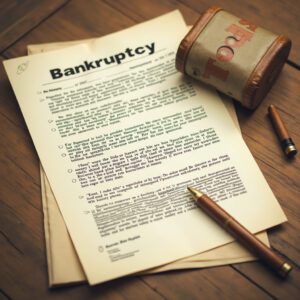Automatic Stay in Bankruptcy

Prospective bankruptcy applicants can achieve debt freedom in different ways yet they may benefit from automatic stay provisions that provide welcome protection. When a person files bankruptcy, it automatically starts the protective “automatic stay” order under U.S. bankruptcy regulations. When you file for bankruptcy, an automatic stay activates to protect you from annoying phone calls combined with nasty letters and potential lawsuits.
When debt collectors fail to understand the injunction, they remain fully responsible for their violations. Automatic stay offers vital respite to borrowers who face home foreclosure and wage reduction because it functions as an unofficial form of debt forgiveness. Under Section 362 of U.S. Bankruptcy Law an automatic stay provides temporary protections preventing all debtors from collection activities by creditors along with collection agencies and government entities.
How Does an Automatic Stay Work?
Derived from its nature to operate in an unassisted manner the term remains fitting. Filing for bankruptcy means an automatic stay starts in accordance with Section 362 under the U.S.
Bankruptcy Code
The majority of bankruptcy filings exceeding 99.9% rely on automatic stays through Chapters 7 and 13. Every debt relief approach through automatic stays functions differently from every other one. Characterized by constraints the automatic stay nevertheless enables debtors to develop financial plans before creditors attempt debt collection. Through an automatic stay both creditors and debtors find protection from financial harm. How so? All creditors experience the same financial protections under this system. After an automatic stay enforces parties cannot pursue debt repayment when any of the creditors cause harm to other creditors who may be owed payments. A complete list of all your creditors must appear in your bankruptcy filing document to notify them about the bankruptcy process and the automatic stay.
An automatic stay isn’t permanent. Throughout bankruptcy court proceedings the automatic stay functions to stop legal actions against debtors and keeps real estate foreclosure and repossession attempts on hold.
What an Automatic Stay Can Prevent
Debtors receiving automatic stay benefits directly from both Chapter 7 and Chapter 13 bankruptcies. The automatic stay functions as more than a multitool yet it does not resolve every issue. The benefits of automatic stay are temporary and protect debtors from certain court actions and actions of foreclosure along with property liens and attempts to repossession during bankruptcy proceedings.
During your bankruptcy case’s opening period the automatic stay brings an end to all upcoming foreclosure efforts. Stays enable tenants to keep their homes but their protective benefits last for shorter durations than the protections afforded to mortgage holders facing foreclosure.
Here are some of the areas it can help, but remember, the help is temporary…
• Foreclosure – An automatic stay will keep foreclosure proceedings on hold for as long as your bankruptcy case is open.
• Eviction – Stays can be helpful for tenants but the relief is not as open-ended as it is with foreclosure. A stay against eviction applies for a short period under bankruptcy but a landlord can ask for the stay to end as long as the bankruptcy proceeds. Under bankruptcy protection, utility services cannot be interrupted for at least 20 days even though what debtors owe in unpaid utility bills will remain unchanged. The collection of public benefits’ overpayments is blocked during bankruptcy proceedings through an automatic stay measure for any type of public benefit reimbursement.
The agency that provides benefits remains able to interrupt their payments to you. Through bankruptcy protection a debtor remains shielded from successive wage garnishments that attempt to seize their earnings. Your income garnishment could be permanently blocked when you file bankruptcy because the debt resulting in garnishment gets eliminated during bankruptcy proceedings.
For further information, you can consult with an expert Bankruptcy Lawyer at Ferguson & Ferguson or call here (256)534-3435 as well!
